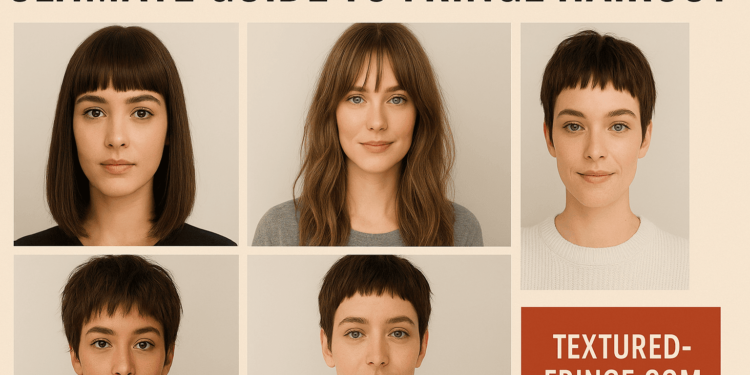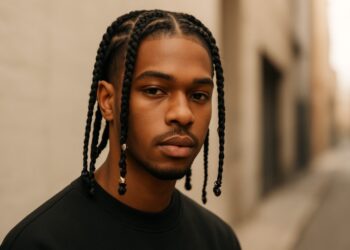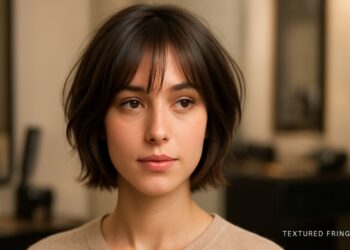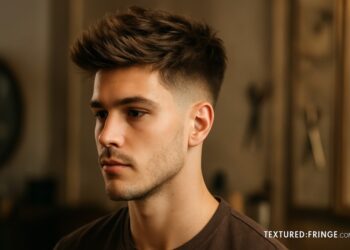Summary
Fringe haircuts, commonly known as bangs, have remained a timeless hairstyle choice across generations. From their early rise in fashion history to their current revival on social media, fringes continue to offer versatility, personality, and style. With numerous variations—like blunt, curtain, wispy, and side-swept—fringe styles can complement different face shapes and enhance individual features. Proper styling and maintenance are key to keeping a fringe fresh, while modern trends show that fringes are gender-inclusive and adaptable for both classic and bold looks. Ultimately, a fringe haircut is more than just a style—it’s a statement of personality and a tool for self-expression.
Key Takeaways
- Fringe haircuts are timeless and have cycled in and out of fashion but never truly disappeared.
- Different fringe styles (blunt, curtain, wispy, side-swept, etc.) suit different face shapes and hair textures.
- Maintenance is crucial—regular trims and proper styling techniques keep a fringe looking sharp.
- Fringes are versatile, allowing for subtle changes or bold transformations without a full haircut.
- Modern trends embrace inclusivity, making fringes a unisex, universally adaptable hairstyle.
Why the Fringe Never Goes Out of Style
At Textured Fringe, we’ve seen how a simple fringe can completely redefine someone’s look—whether you’re after a soft, effortless vibe or a bold, fashion-forward statement. There’s something about a fringe (or bangs, depending on what side of the world you’re from) that just never seems to fade out of fashion. It’s a small change compared to a full haircut, yet it completely transforms your look. Fringes have been around for decades, moving in and out of trend cycles, but never disappearing. Whether it’s blunt, wispy, or curtain-style, the fringe sits in that sweet spot of being both classic and trendy.
Personally, I’ve always loved how a fringe adds instant personality—one snip and suddenly your look is sharper, softer, or even edgier, depending on the cut.
A Brief History of the Fringe
Fringes aren’t new. Historians believe they appeared in ancient cultures, but they truly became a style statement in the early 20th century. The 1920s gave us short bobs paired with straight bangs—think flapper chic. By the 1960s, icons like Brigitte Bardot and Jane Birkin made long, curtain-style fringes irresistible. Audrey Hepburn’s blunt bangs in Roman Holiday are still referenced today, while Zooey Deschanel practically owned the quirky-girl blunt fringe in the 2000s.
Every era reinvents it, but the essence of the fringe stays the same—bold, flattering, and versatile.
Types of Fringe Haircuts
Straight Blunt Fringe
This is the classic, cut straight across the forehead, usually thick and bold. It gives off a dramatic, chic vibe.
- Pros: Sharp, statement-making, draws attention to the eyes.
- Cons: Needs frequent trims and can look harsh if not styled.
- Best for: Oval and long faces (balances proportions).
Side-Swept Fringe
Cut at an angle, this style blends into the rest of your hair. It’s subtle and elegant.
- Pros: Easy to style, low maintenance, softens facial features.
- Cons: Can lose shape quickly if hair grows fast.
- Best for: Round and square faces (slims and elongates).
Curtain Bangs
These part in the middle (or slightly off-center) and frame the face. Very 70s, but hugely popular today.
- Pros: Low-maintenance, versatile, easy to grow out.
- Cons: Can feel heavy if not layered properly.
- Best for: Almost all face shapes—especially heart-shaped and oval.
Wispy Fringe
Light, feathered bangs that don’t fully cover the forehead. They add softness without committing to a heavy look.
- Pros: Easygoing, flattering, adds texture.
- Cons: Can get lost in thick hair, may need styling products.
- Best for: Square faces (softens angles), round faces.
Micro Fringe (Baby Bangs)
Very short, usually above the eyebrows. Bold, artsy, and attention-grabbing.
- Pros: Unique, edgy, makes a strong statement.
- Cons: Not forgiving, hard to grow out, doesn’t suit everyone.
- Best for: Oval or heart-shaped faces (shows off bone structure).
Textured/Layered Fringe
Choppy, layered, and styled to look effortless. Textured Fringe is perfect for adding movement and personality.
- Pros: Modern, low-effort, hides uneven hairlines.
- Cons: Can look messy if not styled properly.
- Best for: All face shapes, especially if you want a laid-back vibe.
Choosing the Right Fringe for Your Face Shape
- Round face: Go for side-swept or curtain fringes to elongate.
- Square face: Wispy or curtain fringes soften strong angles.
- Oval face: Lucky you—almost any style works.
- Heart-shaped face: Feathered or curtain fringes balance the forehead.
- Long face: Blunt or curtain fringes shorten the length visually.
Tip: Always think about your lifestyle too. If you hate styling, avoid heavy fringes that need daily blow-drying.
Styling and Maintenance Tips
- Styling: Use a round brush when blow-drying, or a flat iron for sleekness. A little texturizing spray works wonders for curtain or wispy fringes.
- Maintenance: Wash your fringe more often than the rest of your hair since it touches your forehead and gets oily quicker.
- Trimming: Every 3–4 weeks for blunt bangs, 6–8 weeks for wispy or curtain styles.
- Growing out: Side-sweeping and pinning them back is the easiest way to transition.
Fringe Haircuts in Modern Trends
Fringes are everywhere again—thanks to TikTok tutorials and celebrities reviving retro looks. Curtain bangs and wispy fringes in particular are dominating because they’re versatile and forgiving. They’re also becoming more gender-inclusive—men are experimenting with textured and longer fringes, making the style less “feminine-only.”
The future? Expect more playful versions—micro fringes paired with bold colors, or layered styles blending into shags and mullets. At Textured Fringe, we track fringe trends across social media and fashion runways, making sure you always know what’s in style right now.
Conclusion: The Timeless Appeal of the Fringe
Fringes are one of the rare haircut styles that suit almost everyone when tailored properly. They let you reinvent your look without a dramatic chop. Soft, edgy, playful, or polished—there’s a fringe for every mood. If you’ve ever been on the fence about trying one, maybe now’s the time to snip.
FAQs
Do fringes suit all hair types?
Yes, but the style needs adjusting. Blunt bangs work best on straight hair, while wispy or layered fringes complement wavy or curly textures.
Are fringes hard to maintain?
Not always. Curtain and wispy bangs are low-maintenance, while blunt or micro fringes need frequent trims and styling.
Can I cut my own fringe at home?
You can, but be careful. Hair shrinks when it dries, so cut less than you think. A professional cut always looks sharper.
How do I avoid greasy bangs?
Wash just your fringe with a little shampoo or dry shampoo between washes. Keeping hands off your forehead helps too.
Are fringes good for older women?
Absolutely. A soft fringe can frame the face, highlight the eyes, and even make you look younger by hiding fine lines.





